In News
Follow this topic
Bookmark
Record learning outcomes
Better trained managers leads to better workplace wellbeing
Melissa Cochrane, the wellbeing development manager at charity Pharmacist Support, spoke to the pressures of working in pharmacy at the moment. She stressed that wellbeing is about being able to feel safe and confident in the workplace, and that much of this comes from the leadership one experiences.
“You will know the phrase, people join companies but leave managers”, highlighting the importance of training for managers and leaders. Challenges are inevitable, said Melissa, so it is “about having resources and resilience to deal with challenges”.
Melissa also introduced the notion of ‘assuming best intentions’ when dealing with potentially contentious issues in the pharmacy, like a colleague calling in sick at the last minute. Asking things like “what is behind that person doing that?” shifts the perspective and fosters an understanding environment rather than a reactive, judgemental one.
A new opportunity for pharmacy technicians
The addition of oral emergency contraception to the Pharmacy Contraception Service and the ability of pharmacy technicians to provide this service was discussed by Shilpa Shah, CEO of Community Pharmacy North East London (CPNEL), who said: “This is something for pharmacy technicians to be proud of which shows a future for pharmacy technicians from a clinical perspective.”
She reminded audience members of the opportunity this service can provide to look at a customers’ wellbeing, too, perhaps leading to a larger women’s health service in the pharmacy.
The service, paired with the walk-in nature of community pharmacy allows customers a freedom and works against inequalities, but Shilpa stressed that, if pharmacies are offering the service, the whole team needs to be trained in how to sensitively broach the topic and help or signpost where needed.
Key needs for pharmacies to flourish alongside the 10-year-plan
Experts were both excited and nervous at the impact of the 10-year-plan on general practice and pharmacies. One message was clear, though: to develop neighbourhood care communities, primary care providers need to work together and establish clear relationships.
The key needs recognised by the panel were digital integration, funding and a cultural and mindset shift over the provision of primary care for community pharmacy to be able to thrive in the coming years.
End-of-life care has a place in pharmacy
There is plenty of opportunity for community pharmacy teams to get involved with palliative and end-of-life care, especially with the help of the Daffodil Standards. Produced by charity Marie Currie, the Daffodil Standards are designed to support healthcare professionals in delivery high-quality, compassionate care for people nearing the end of life. “There is only one chance to get it right,” said Darrell Baker, Royal Pharmaceutical Society fellow.
TM recently investigated a call by the Royal College of Physicains to Government to urgently improve the state of palliative and end-of-life care in the UK, which you can read here.
Pharmacies and GPs: an opportunity
Dr Dupé Akomolafe and Baba Akomolafe passionately delivered their message that “pharmacy needs a digital front door”, stressing the need for a more strategic workload management system to balance the huge amount of people looking to the GP for help and the huge amount of capable, open and available pharmacy teams who can take much of the strain off their hands.
They proposed integrating a means for customers to book Pharmacy First appointments at an available pharmacy through an app to make the entire process more efficient, for everyone.
Tech is here and now!
Continuing this vein… In separate talks, the Community Pharmacy IT Group (CP ITG) and The Community Pharmacy Patient Safety Group each gave insight into tech and AI developments in health. Notable mentions include EPS, the NHS App to digital referrals and barcode scanning. Pharmacy must incorporate “foundational IT” into their practice, said Matt Armstrong, chair for the CP ITG.
Ambient note taking, enhanced clinical decision support tools and AI tools can be used to enable better care and pharmacy teams must “not just be digitally capable, but digitally enthusiastic” all whilst keeping “patient safety culture instrumental in everything we do”, added Richard Cattell, deputy chief pharmaceutical officer for England, NHS England.
Health literacy and prevention
In empowering patients, we can create a better future, but action needs to be taken now. Figures from the Socioeconomic inequalities in accumulation of multimorbidity in England from 2019 to 2049: a microsimulation projection study project the rise in multimorbidity from 19.2 million people in 2019 to 35.2 million people by 2049.
It is essential that pharmacy keep moving towards “generalist skills sets” and “inter professionalism” playing a big role in the Integrated Neighbourhood Teams (INTs), said Danny Bartlett, clinical lead at Primary Care School Kent Surrey and Sussex.
Of the ways in which to do this, promoting health literacy in the pharmacy was mentioned across multiple talks over the weekend, something pharmacy teams can play a key role in. Whether through conversations on the counter, promoting health campaigns or even adjusting medical language to be more accessible for patients.
Signposting
To learn more about the topics mentioned visit:
- Technology and health: cpe.org.uk
- Multimorbidity: pubmed.ncbi.nlm.nih.gov
- Health literacy: pmc.ncbi.nlm.nih.gov
- Self care: selfcareforum.org
- Daffodil Standards: rpharms.com




